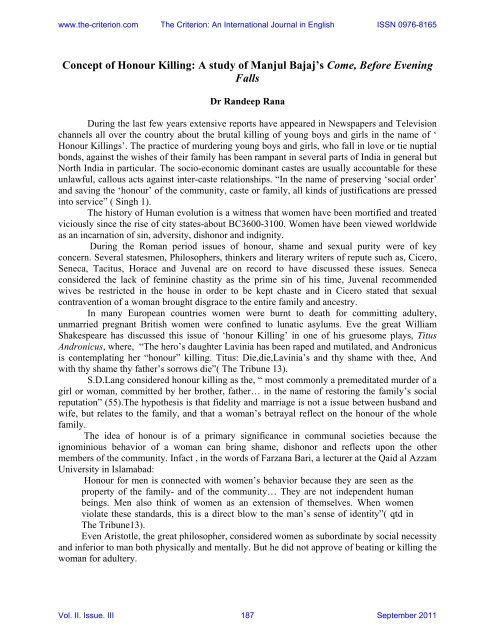Vol. II. Issue. III September 2011 - The Criterion: An International ...
Vol. II. Issue. III September 2011 - The Criterion: An International ...
Vol. II. Issue. III September 2011 - The Criterion: An International ...
You also want an ePaper? Increase the reach of your titles
YUMPU automatically turns print PDFs into web optimized ePapers that Google loves.
www.the-criterion.com <strong>The</strong> <strong>Criterion</strong>: <strong>An</strong> <strong>International</strong> Journal in English ISSN 0976-8165<br />
Concept of Honour Killing: A study of Manjul Bajaj’s Come, Before Evening<br />
Falls<br />
Dr Randeep Rana<br />
During the last few years extensive reports have appeared in Newspapers and Television<br />
channels all over the country about the brutal killing of young boys and girls in the name of ‘<br />
Honour Killings’. <strong>The</strong> practice of murdering young boys and girls, who fall in love or tie nuptial<br />
bonds, against the wishes of their family has been rampant in several parts of India in general but<br />
North India in particular. <strong>The</strong> socio-economic dominant castes are usually accountable for these<br />
unlawful, callous acts against inter-caste relationships. “In the name of preserving ‘social order’<br />
and saving the ‘honour’ of the community, caste or family, all kinds of justifications are pressed<br />
into service” ( Singh 1).<br />
<strong>The</strong> history of Human evolution is a witness that women have been mortified and treated<br />
viciously since the rise of city states-about BC3600-3100. Women have been viewed worldwide<br />
as an incarnation of sin, adversity, dishonor and indignity.<br />
During the Roman period issues of honour, shame and sexual purity were of key<br />
concern. Several statesmen, Philosophers, thinkers and literary writers of repute such as, Cicero,<br />
Seneca, Tacitus, Horace and Juvenal are on record to have discussed these issues. Seneca<br />
considered the lack of feminine chastity as the prime sin of his time, Juvenal recommended<br />
wives be restricted in the house in order to be kept chaste and in Cicero stated that sexual<br />
contravention of a woman brought disgrace to the entire family and ancestry.<br />
In many European countries women were burnt to death for committing adultery,<br />
unmarried pregnant British women were confined to lunatic asylums. Eve the great William<br />
Shakespeare has discussed this issue of ‘honour Killing’ in one of his gruesome plays, Titus<br />
<strong>An</strong>dronicus, where, “<strong>The</strong> hero’s daughter Lavinia has been raped and mutilated, and <strong>An</strong>dronicus<br />
is contemplating her “honour” killing. Titus: Die,die,Lavinia’s and thy shame with thee, <strong>An</strong>d<br />
with thy shame thy father’s sorrows die”( <strong>The</strong> Tribune 13).<br />
S.D.Lang considered honour killing as the, “ most commonly a premeditated murder of a<br />
girl or woman, committed by her brother, father… in the name of restoring the family’s social<br />
reputation” (55).<strong>The</strong> hypothesis is that fidelity and marriage is not a issue between husband and<br />
wife, but relates to the family, and that a woman’s betrayal reflect on the honour of the whole<br />
family.<br />
<strong>The</strong> idea of honour is of a primary significance in communal societies because the<br />
ignominious behavior of a woman can bring shame, dishonor and reflects upon the other<br />
members of the community. Infact , in the words of Farzana Bari, a lecturer at the Qaid al Azzam<br />
University in Islamabad:<br />
Honour for men is connected with women’s behavior because they are seen as the<br />
property of the family- and of the community… <strong>The</strong>y are not independent human<br />
beings. Men also think of women as an extension of themselves. When women<br />
violate these standards, this is a direct blow to the man’s sense of identity”( qtd in<br />
<strong>The</strong> Tribune13).<br />
Even Aristotle, the great philosopher, considered women as subordinate by social necessity<br />
and inferior to man both physically and mentally. But he did not approve of beating or killing the<br />
woman for adultery.<br />
<strong>Vol</strong>. <strong>II</strong>. <strong>Issue</strong>. <strong>II</strong>I 187 <strong>September</strong> <strong>2011</strong>
















